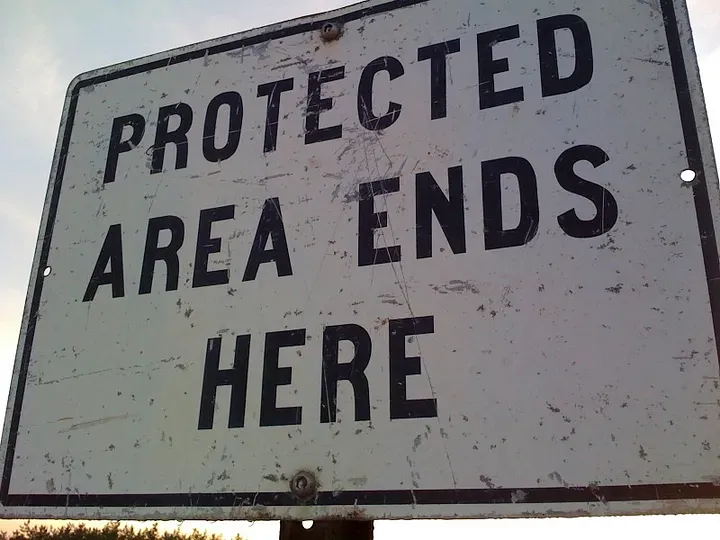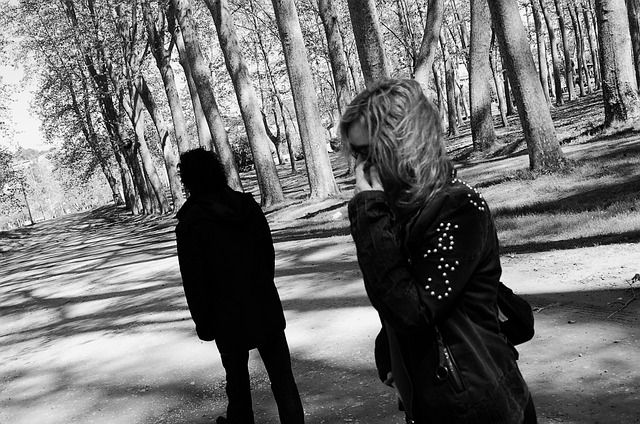The Thorniness of Trust

TRUST. One dictionary defines it thusly:
n. firm belief in the reliability, truth, ability, or strength of someone or something
It’s a quintessential component of humanity that’s often shared, instinctively, among the animal kingdom. We make it more complex than that, of course; a baby elephant probably has no distinction between its own instinctive trust of its parents and the fallibility of nature to protect it against outside threats. We make that leap of faith, and it’s a choice, not instinct.
Instinct and experience lead us astray from trust. Maybe that’s as it should be. The world is full of people who scam, manipulate, cheat and even murder; there’s no shortage of pitfalls and dangers, sometimes even among our closest allies.
It was 1997 when I met my ex. We didn’t actually like each other very much at first, until we got to know one another. We formed an unlikely bond over rudimentary traits: a sense of humor and love of the English language. We both loved music, though not the same music, and we both enjoyed movies. We became lovers as well as friends, but not always the friends we should have been to one another.
It was another few years until we became “serious.” After fits and starts in our troubled friendship, we began to share a living space, moving from the quiet safety of our separate homes in New Jersey and into the uncertainty of a future in Providence, Rhode Island. It was then that we learned that we were doomed as a couple, and it was only our long friendship and history that kept us together as long as we were able to, about two years after we became residents of the city.
Our paths through the world were not parallel, and she thought I had so much more potential to grab life and wrestle it into submission. That made her angry. She may have been right. Either way, after she finally called it quits, we managed to remain friends. After all that had happened, so many tearful nights staying up late, trying to reassure ourselves that we would survive, she left the United States to teach English in Japan. We tossed around the idea of trying again when she returned. By this time, we had intertwined ourselves into each other’s lives so fully that complete separation was unthinkable.
We continued talking while she was in Japan, and when she came home, we stayed friends. I had moved back to New Jersey, into an absolutely horrible relationship that haunts me to this day. My ex was my savior, getting me out of the house, helping me to have some fun in my otherwise miserable existence. She was there for me when I needed her. I tried to be there for her in some way, but she did not seem to need me. She had it together. I was the mess.
After fourteen years of friendship, there was an implicit trust there. We knew the best and worst of each other, and chose to be friends anyway. Subsequent to lighting out of that terrible relationship, I moved back to Providence. And at fifteen years, my friendship with her was still the longest history I’d ever had with someone.
Then she broke that trust.
Social media is a funny thing. It keeps people connected to one another in a surface fashion, and at times, we’ll use it to communicate deeper, more complicated feelings, but we’re alwaysfiltering. When that filter fails, it can change lives.
LiveJournal, where she and I both kept journals, has filtering tools in place, but you have to actually use them, and that human failing to do so occurred one late night, a mere two days after my birthday in 2011. She had written some dreadful, nasty things about me. I wasn’t prepared for the vitriol that came from the screen.
What could she have said that was so appalling? Imagine the worst things you think about yourself. The things that keep you up at night, the things that make you the most self-conscious. Now imagine that the person you trust and care about more than anyone else thinks the same things about you. Then writes them down, unprovoked, and shares them with others.
That’s what I read that night.
I never got an apology for the things she said. She was sorry, but only that I had seen what she had written. I replied that if she thinks the worst of me and assumes that every action and thing that I say is so terrible, then why continue being friends?
That was the end. The end of fifteen years of friendship, love, laughter, and trying so hard to make it through tough times together. The pointlessness of it all really got to me. But I would survive. I would believe that I was worth more than two-faced lies, for that is what the whole thing ended up feeling like. Friends with me in one instant, but secretly saying awful, horrendous things about me the next.
Of course, it wasn’t that simple. It never is. Really, though, I thought only one thing was certain; I wouldn’t implicitly trust anyone ever again.
When you trust, you create a weapon, and you give that weapon to those you love. That weapon can have many uses. It can be used as a shield and defense, helping those we care about and who trust us defend themselves from the onslaught of the world. It can be used as an umbrella, keeping the rain off our heads and treating us to warmth and safety.
Somehow, all too often, everything breaks down, and a weapon is used as its namesake purpose. For when we trust, we give the tool of our own destruction over to another person, who can sheath or wield it at will.
When the weapon is drawn, and used, and buried in our hearts, there is no betrayal more shocking, or more gruesome, than when our own insecurities and worst self-thoughts are used against us. Sadly, even the best of us are capable of this act.
My ex was surprised to learn, as our friendship was in its death throes, that I had nothing bad to say about her to others. “I’m sure you’ve had typical negative ex-girlfriend things to say about me,” she reasoned. “No,” I replied. “You were my closest friend all this time, and I have had nothing bad to say about you. In fact, I speak so well of you that a recent date had to ask if there was a chance of you and I getting back together.”
That was the truth. Despite our failings as a couple, I considered her an integral part of the whole of my humanity. She was partly responsible for a lot of the good in my life at the time. I had trusted her, and I believed that she had trusted me. No matter what had happened before, I always believed that she had faith in me. How could I say bad things about her?
We never learn.
Perhaps that’s an unfair assessment, because obviously, we do learn. We make many mistakes that we are conscious of, sometimes pointed out to us in constructive, helpful feedback. But often, we’re unaware of the basic, underlying motivations for our behaviors that become the bedrock of all of our relationships. It’s in this stratum of our personality that we make the same mistakes, over and over.
That’s not to say that trust should never happen. On the contrary; when we trust another implicitly, we give an imperfect yet sacrosanct piece of ourselves to another, imperfect human being. It is a gift, and can be seen as nothing but. No matter how merited or unmerited that gift may be, it is part of our humanity to give of ourselves what we can to another. To trust is to be vulnerable, and to be vulnerable is to be brave. To be trusted is to be honored.
And even the most ideal human is still imperfect, and to be trusted is also to be given the chance to fail. I have done it. So have you.
But the most important human quality of all, forgiveness, is a salve that can ease the pain when the weapon gets used.
All we need to do is ask for it.




Comments ()